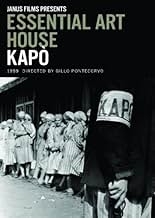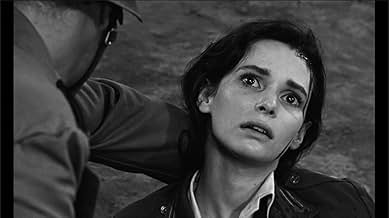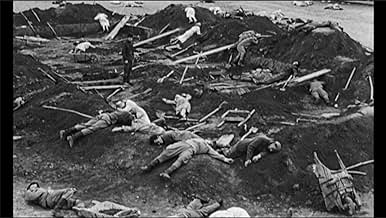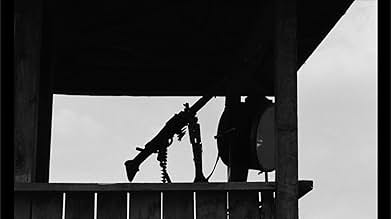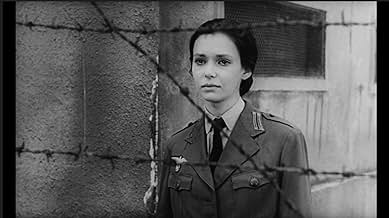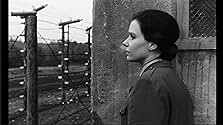Kapò
- 1960
- 1h 57min
NOTE IMDb
7,6/10
2,8 k
MA NOTE
Une jeune fille juive mène une tentative d'évasion d'un camp de concentration.Une jeune fille juive mène une tentative d'évasion d'un camp de concentration.Une jeune fille juive mène une tentative d'évasion d'un camp de concentration.
- Réalisation
- Scénario
- Casting principal
- Nommé pour 1 Oscar
- 3 victoires et 4 nominations au total
Semka Sokolovic-Bertok
- Une detenuta
- (as Semca Sokolovic)
Dirjana Dojic
- Ninette
- (as Dirjana Dojc)
Graziella Durano
- Une detenuta
- (non crédité)
Sima Janicijevic
- Il medico di Auschwitz
- (non crédité)
Rastislav Jovic
- Yanko Milovich
- (non crédité)
Dusan Perkovic
- Il commandante tedesco
- (non crédité)
Avis à la une
This film relates the story of a 14-year-old Jewish girl during her captivity in a Nazi concentration camp. Her role is portrayed by 21 year old Susan Strasberg who had portrayed Anne Frank on stage and Kim Novak's little sister, Millie Owens, in Picnic (1955). Kapò was nominated for an Academy Award for Best Foreign Language Film in 1960, when the Oscar went to Ingmar Bergman's The Virgin Spring.
In 1966, another Gillo Pontecorvo film---The Battle of Algiers--would be nominated in that same category. That year the Oscar went to A Man and a Woman. (I think that the Academy 'missed the boat THAT year!! The idea that The Battle of Algiers could be missed for its greatness is hard to imagine!)
As Kapò begins, Edith (Susan Strasberg), has just finished her harpsichord lesson and is going home when she sees her parents being arrested by the Nazis. When she runs to them, she too, is arrested. The family is transported in a boxcar to a concentration camp in Poland. Once there, the she is separated from her parents and taken to a separate cell block. Anxious to find them, she enters their cell block where we see the film's first terrible images of the over crowed and starving prisoners. While she is unable to find her parents, another female prisoner, Sofia (Didi Perego), sees her there and takes her to a camp doctor for help. Since Edith is new to the camp--and another girl her age had just died the night before--the doctor instructs her how to change her identity and be saved from certain death. As he explains, the prisoners are treated differently based on which patch they have on their smocks: a yellow Star of David indicates that they are Jews; a red patch (such as the doctor's) identifies them as political prisoners; and a black triangle indicates that they are criminals. The doctor tells Edith that she must cut her hair, change her clothes with those of the dead girl and take on a new identity, as Nicole Niepas, a non-Jewish criminal (with a black triangle on her smock).
Camp police (kapòs) are chosen from among the criminal group. They are hated by their fellow prisoners but useful to the SS officers who use them as their eyes and ears within the cell blocks. By being harsh on the other prisoners and reporting any resistance or planned insubordination to their Germans captures, the kapos are given special privileges such as food, clothing, and use of sanitary facilities. But, most importantly, if they do their jobs well, they are not likely to be exterminated with the other prisoners.
Later, Edith sees her parents being marched off to be killed in the gas chamber. With all hope lost, Edith (as Nicole Niepas) becomes a kapo. Her transformation from victim to 'victimizer' increases as she reports the activities of other prisoners and fraternizes with a German soldier in the camp. (She loses her virginity to one of the soldiers in the camp.) Her personal harshness is diminished when Russian POWs are taken to the same concentration camp and she falls in love with the Russian soldier, Sascha (Laurent Terzieff). As the Allies approach the camp near the end of the war in Europe, she agrees to take part in a daring escape plan. But, the as the plan takes shape, we realize that it is not totally without sacrifice..
In 1966, another Gillo Pontecorvo film---The Battle of Algiers--would be nominated in that same category. That year the Oscar went to A Man and a Woman. (I think that the Academy 'missed the boat THAT year!! The idea that The Battle of Algiers could be missed for its greatness is hard to imagine!)
As Kapò begins, Edith (Susan Strasberg), has just finished her harpsichord lesson and is going home when she sees her parents being arrested by the Nazis. When she runs to them, she too, is arrested. The family is transported in a boxcar to a concentration camp in Poland. Once there, the she is separated from her parents and taken to a separate cell block. Anxious to find them, she enters their cell block where we see the film's first terrible images of the over crowed and starving prisoners. While she is unable to find her parents, another female prisoner, Sofia (Didi Perego), sees her there and takes her to a camp doctor for help. Since Edith is new to the camp--and another girl her age had just died the night before--the doctor instructs her how to change her identity and be saved from certain death. As he explains, the prisoners are treated differently based on which patch they have on their smocks: a yellow Star of David indicates that they are Jews; a red patch (such as the doctor's) identifies them as political prisoners; and a black triangle indicates that they are criminals. The doctor tells Edith that she must cut her hair, change her clothes with those of the dead girl and take on a new identity, as Nicole Niepas, a non-Jewish criminal (with a black triangle on her smock).
Camp police (kapòs) are chosen from among the criminal group. They are hated by their fellow prisoners but useful to the SS officers who use them as their eyes and ears within the cell blocks. By being harsh on the other prisoners and reporting any resistance or planned insubordination to their Germans captures, the kapos are given special privileges such as food, clothing, and use of sanitary facilities. But, most importantly, if they do their jobs well, they are not likely to be exterminated with the other prisoners.
Later, Edith sees her parents being marched off to be killed in the gas chamber. With all hope lost, Edith (as Nicole Niepas) becomes a kapo. Her transformation from victim to 'victimizer' increases as she reports the activities of other prisoners and fraternizes with a German soldier in the camp. (She loses her virginity to one of the soldiers in the camp.) Her personal harshness is diminished when Russian POWs are taken to the same concentration camp and she falls in love with the Russian soldier, Sascha (Laurent Terzieff). As the Allies approach the camp near the end of the war in Europe, she agrees to take part in a daring escape plan. But, the as the plan takes shape, we realize that it is not totally without sacrifice..
I've never really liked holocaust flicks because they get well, usually made so that the dumbest of the dumb to 'get it.' Kapo is just a movie that shows, not tells, which of course makes the best story. Thanks to TCM for playing this gem that I'll buy on DVD as soon as it comes out. I'd never even heard of it, and I have seen a LOT of flicks.
Susan Strasburg does an incredible job as Nicollete / Edith. Her transformation from shell-shocked victim to cynical survivor is absolutely gripping. The tension in the movie builds to nearly unbearable level and the end simply leaves you scooping your jaw off the floor.
This is the type of movie I sorely needed after going on a loooong dry spell of celluloid garbage. Why this movie isn't famous, I have no idea, but it should be.
Susan Strasburg does an incredible job as Nicollete / Edith. Her transformation from shell-shocked victim to cynical survivor is absolutely gripping. The tension in the movie builds to nearly unbearable level and the end simply leaves you scooping your jaw off the floor.
This is the type of movie I sorely needed after going on a loooong dry spell of celluloid garbage. Why this movie isn't famous, I have no idea, but it should be.
Although it features two French leads (Laurent Terzieff and Emmanuelle Riva) ,"Kapo" has disappeared from the French dictionaries of films whereas lots of duds are included.
With the exceptions of "Nuit et Brouillard" (which was an exceptional documentary ) and Wanda Jakubowska 's "ostatni etap' (1947) there were few movies which at the time broached the concentration camps subject(the last scenes of Dmytryk's "young lions" ,1958)
Susan Strasberg was impressive ,mainly in the first hour though the evolution of her character is not always believable.Besides,her relationship with Sascha weakens the plot .
Emmanuelle Riva almost outshines Strasberg,maybe because she was a more experimented actress (she was featured in Resnais's "Hiroshima Mon Amour" ) and her scene when she is translating the German words in a voice chocked with emotion may be the strongest in the whole movie.
The "potato" scene is also revealing.I remember what Simone Veil ,a former French minister (secretary) (and herself a former prisoner in a concentration camp),said after watching the last episode of "Holocaust " (the seventies miniseries) : "in the camps ,people were not as helpful ,as kind ,as compassionate as they are in the film" ."Kapo" shows a very harsh world where the women are almost always fighting against their mates:that's the story of Edith /Nicole .
When it was released ,the movie was trashed by Jacques Rivette because of a tracking after Riva 's death ;at the time Nouvelle vague= intellectual dictatorship.Although defended by the Italian masters (including Visconti),the movie was cursed .The IMDb users have restored it to favor.
With the exceptions of "Nuit et Brouillard" (which was an exceptional documentary ) and Wanda Jakubowska 's "ostatni etap' (1947) there were few movies which at the time broached the concentration camps subject(the last scenes of Dmytryk's "young lions" ,1958)
Susan Strasberg was impressive ,mainly in the first hour though the evolution of her character is not always believable.Besides,her relationship with Sascha weakens the plot .
Emmanuelle Riva almost outshines Strasberg,maybe because she was a more experimented actress (she was featured in Resnais's "Hiroshima Mon Amour" ) and her scene when she is translating the German words in a voice chocked with emotion may be the strongest in the whole movie.
The "potato" scene is also revealing.I remember what Simone Veil ,a former French minister (secretary) (and herself a former prisoner in a concentration camp),said after watching the last episode of "Holocaust " (the seventies miniseries) : "in the camps ,people were not as helpful ,as kind ,as compassionate as they are in the film" ."Kapo" shows a very harsh world where the women are almost always fighting against their mates:that's the story of Edith /Nicole .
When it was released ,the movie was trashed by Jacques Rivette because of a tracking after Riva 's death ;at the time Nouvelle vague= intellectual dictatorship.Although defended by the Italian masters (including Visconti),the movie was cursed .The IMDb users have restored it to favor.
I was not previously aware of this gem. I found it on TCM after it had already been on for about 10 minutes. I kept thinking that the lead actress looked just like SUSAN STRASBERG & for good reason. It was. The fact that it was foreign with sub-titles threw me initially. Very realistic, almost raw, which was surprising considering that this movie was made in 1959.
STRASBERG as 'Nicole' works her way up through a concentration camp to become the woman in charge of her fellow prisoners. Strong language, violent situations, but this is a story about WWII, not the 'Enchanted Forest'. Good storyline, good direction, & a terrific performance by SUSAN STRASBERG that was all the more admirable when you realize that she was all of 20,21 when she made this.
STRASBERG as 'Nicole' works her way up through a concentration camp to become the woman in charge of her fellow prisoners. Strong language, violent situations, but this is a story about WWII, not the 'Enchanted Forest'. Good storyline, good direction, & a terrific performance by SUSAN STRASBERG that was all the more admirable when you realize that she was all of 20,21 when she made this.
If somebody would like to see what was a nazi prison, one has to see this movies. It showed with realism the nature of cruelty by nazis and the ways they used some of their prisoners to watch the movement of the rest and to combat effectively any possible plot against them. Pontecorvo is a director with a few films, but all of them always show real facts of the history, and this film is not an exception
Le saviez-vous
- AnecdotesThe producers imposed a romance line in the story and also another ending, different from the one Pontecorvo, the director, wished to shoot.
- GaffesIn the opening scene, Edith walks past some shops on her way back home. One of the shops look like it belongs to the booming 1950s than the more austere WWII period. There is a toy car or baby push car in the store window that shows the typical car design of the 1950s.
- Citations
Edith, alias Nicole Niepas: [to Sasha] Your mother won't like me, I'm not a good girl, and my name's not Nicole, I'm a Jew.
- ConnexionsFeatured in Pontecorvo: The Dictatorship of Truth (1992)
Meilleurs choix
Connectez-vous pour évaluer et suivre la liste de favoris afin de recevoir des recommandations personnalisées
- How long is Kapo?Alimenté par Alexa
Détails
- Durée
- 1h 57min(117 min)
- Couleur
- Mixage
- Rapport de forme
- 1.66 : 1
Contribuer à cette page
Suggérer une modification ou ajouter du contenu manquant


